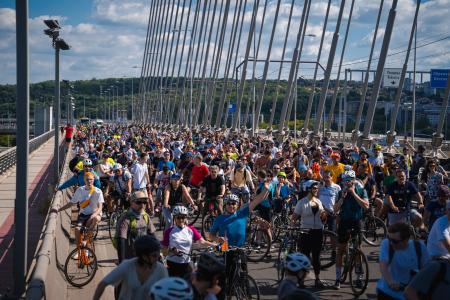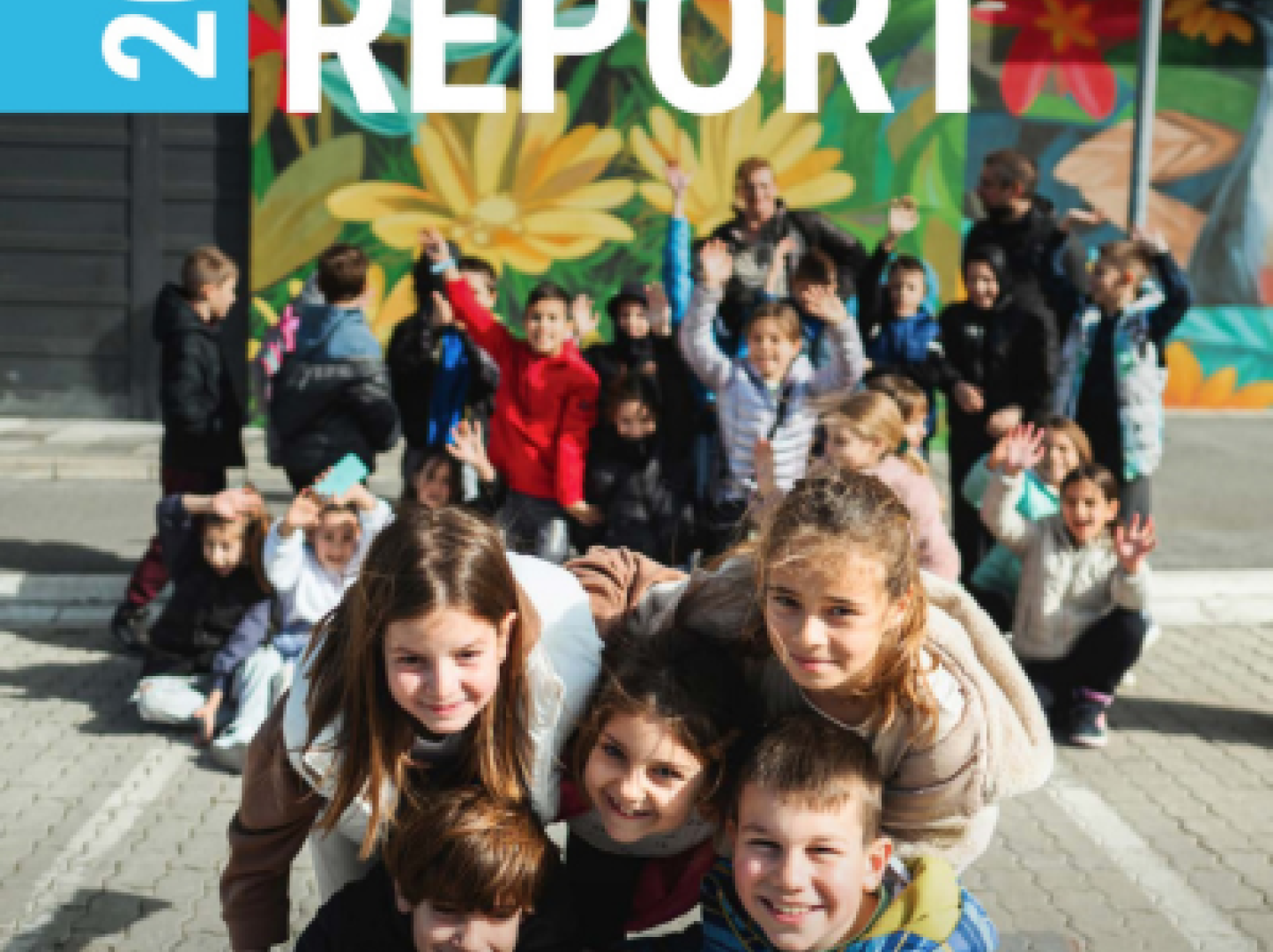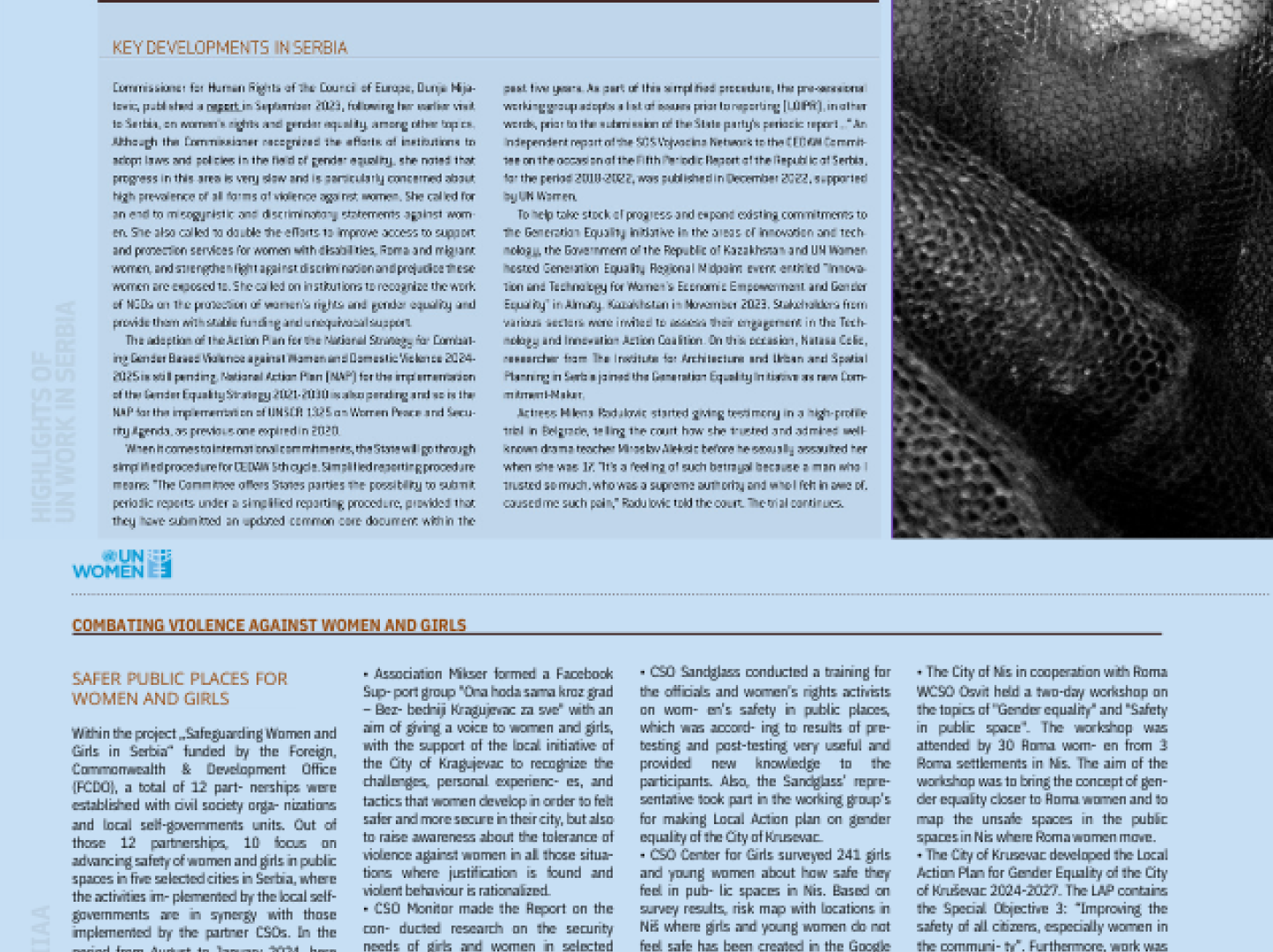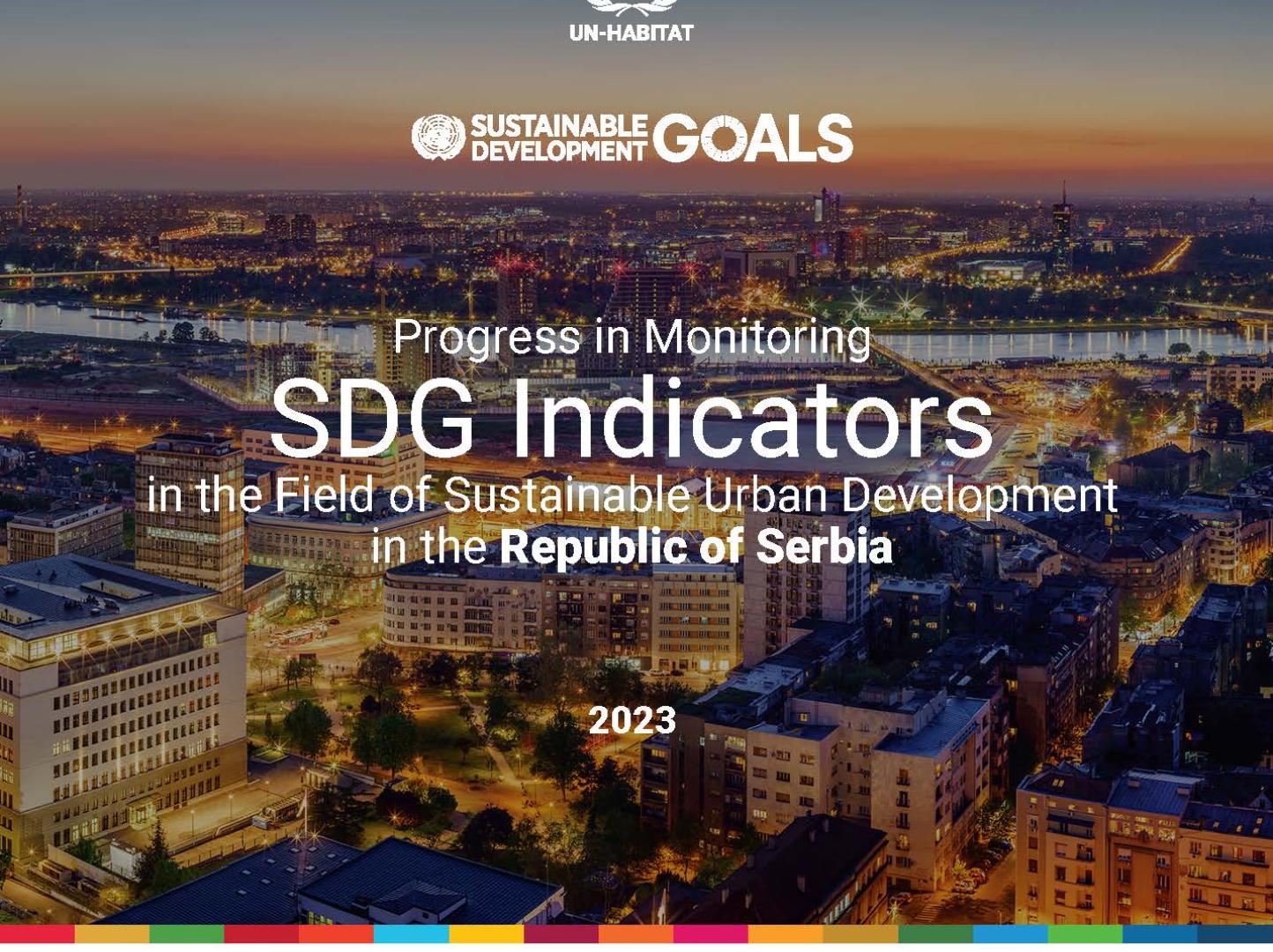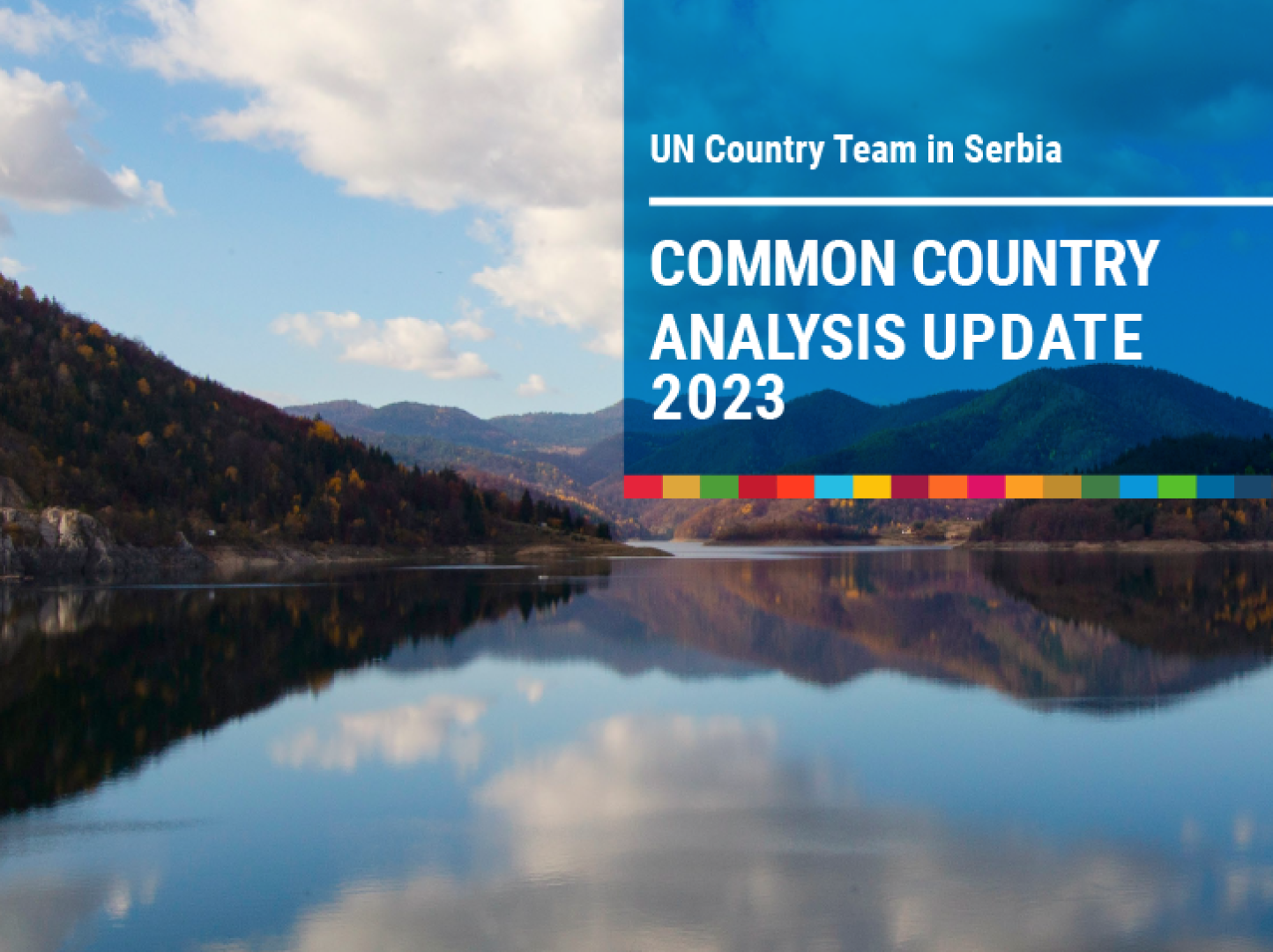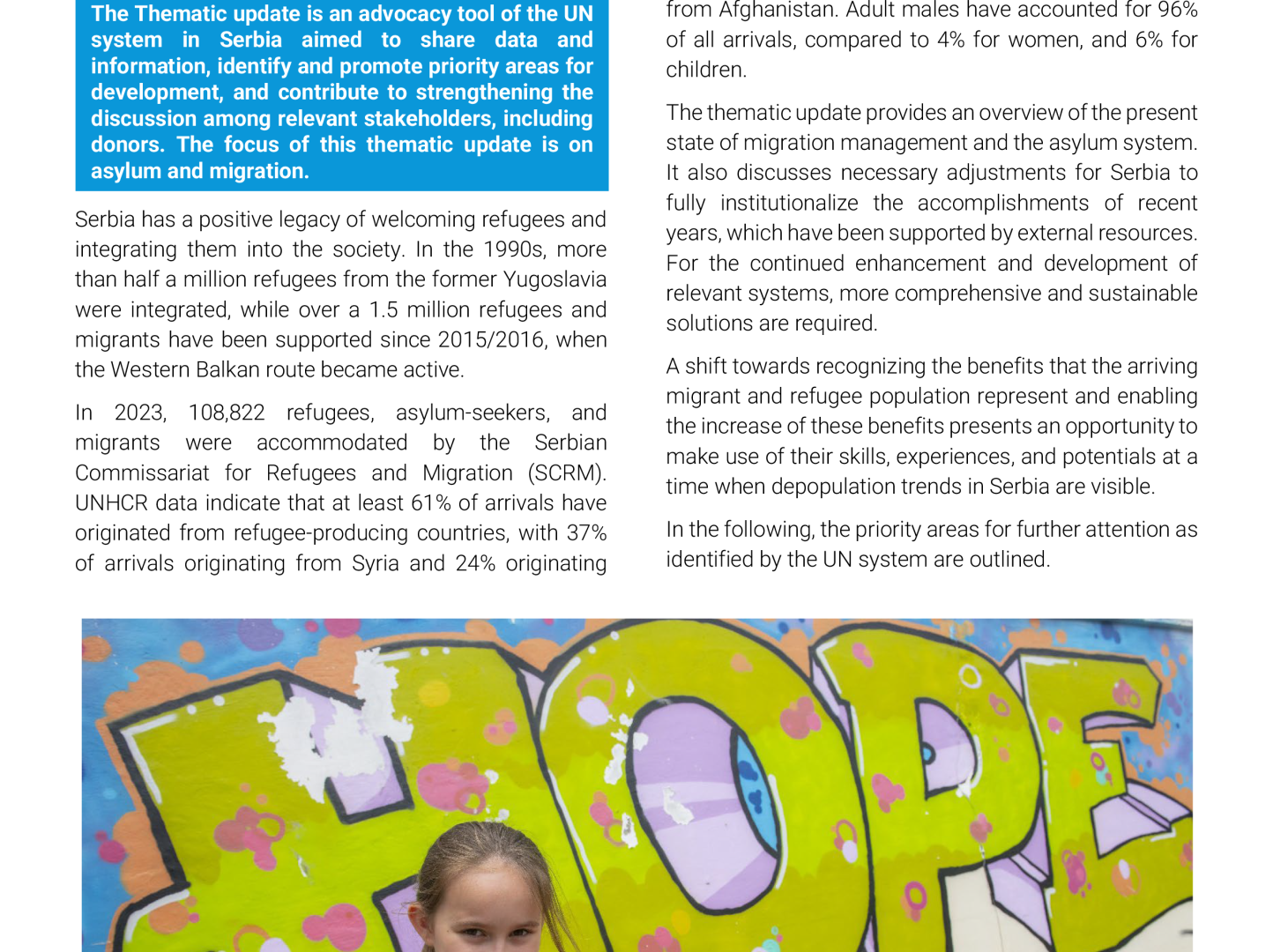Latest
Speech
24 June 2025
Serbia Goes Green - UN RC talking points
Learn more
Story
17 June 2025
Youth and decision-makers join forces to counter hate speech through dialogue and art – and the launch of the “Tolerance” campaign
Learn more
Speech
05 June 2025
World Environment Day 2025 - UN RC talking points
Learn more
Latest
The Sustainable Development Goals in Serbia
The Sustainable Development Goals are a global call to action to end poverty, protect the earth’s environment and climate, and ensure that people everywhere can enjoy peace and prosperity. These are the goals the UN is working on in Serbia:
Story
18 June 2024
Matilde Mordt Assumes Role as New UN Resident Coordinator in Serbia
Belgrade, June 17, 2024 – Matilde Mordt has officially assumed her duties as the new United Nations Resident Coordinator in Serbia following a credentials presentation to the Minister of Foreign Affairs, Marko Đurić which marks the beginning of her role in enhancing the collaboration between Serbia and the United Nations.With more than three decades of experience, Ms. Mordt brings extensive knowledge in the areas of the 2030 Agenda for Sustainable Development, environment and climate change, governance, social policy, and disaster risk reduction. Her previous positions include serving as the UN Development Programme (UNDP) Resident Representative in Ecuador, and various leadership roles within the UNDP in Nicaragua, Paraguay, Argentina, and at the regional hub for Latin America and the Caribbean in Panama. She has also been involved in research and teaching on sustainable development and climate change.Ms. Mordt holds a PhD in Human and Economic Geography with a specialization in livelihoods and sustainability, a master’s degree in international economics and business administration, and a Bachelor’s in social studies from the University of Gothenburg, Sweden. Her appointment is expected to further strengthen the ongoing cooperation and development efforts between Serbia and the United Nations. , filtered_html
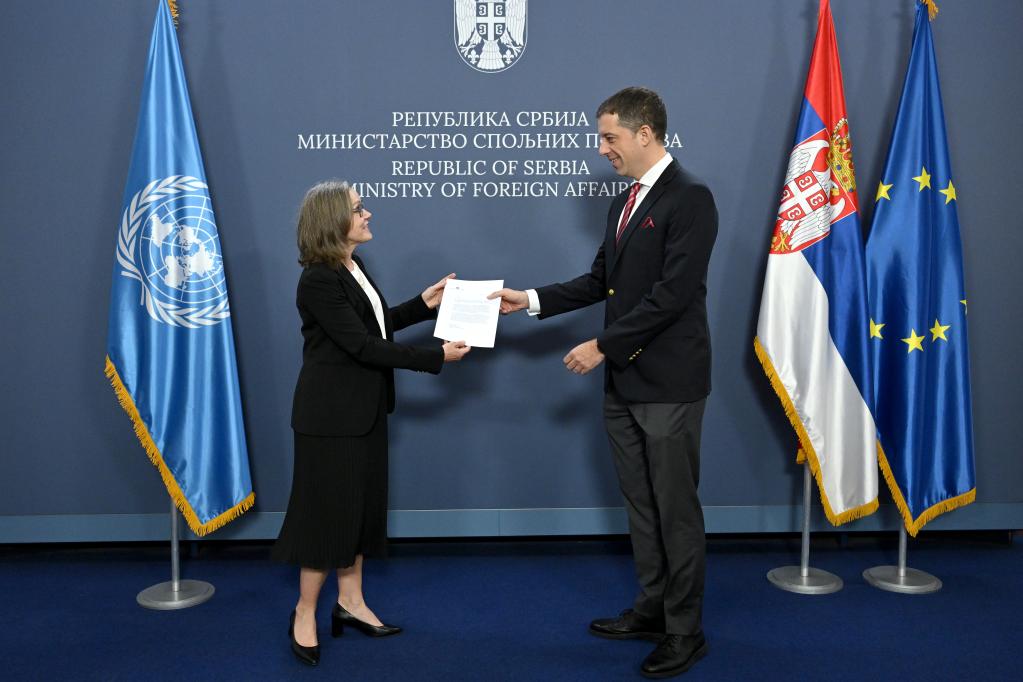
Story
17 June 2025
Youth and decision-makers join forces to counter hate speech through dialogue and art – and the launch of the “Tolerance” campaign
Belgrade, Serbia, 17 June 2025 – In a strong show of solidarity against hate and discrimination, youth representatives and senior officials gathered at the Silosi cultural centre in Belgrade to mark the International Day for Countering Hate Speech. The event featured a vibrant panel discussion followed by the unveiling of a large mural, both aiming to foster unity, inclusion, and resilience in the face of rising hate speech in the region.The gathering also marked the launch of the joint “Tolerance” campaign — a six-month awareness-raising initiative by the United Nations and the Council of Europe aimed at promoting inclusion and countering hate through youth engagement, education, media and public dialogue. Organised under the joint European Union and Council of Europe programme Horizontal Facility for the Western Balkans and Türkiye, and in partnership with the UN Country Team in Serbia, the event highlighted the power of youth participation in shaping anti-discrimination policies and narratives.Opening the event, Janos Babity, Head of the Council of Europe Office in Belgrade, said that the International Day for Countering Hate Speech serves as a powerful reminder of the urgent need to address hate speech in all its forms—online and offline—and to build inclusive, respectful societies rooted in human rights, equality, and mutual understanding. “At the heart of this effort are young people, who continue to be among the most affected by discrimination but also among the most vocal and creative agents of change. Their leadership, ideas, and courage are essential to confronting intolerance and reshaping narratives of exclusion into those of solidarity and shared humanity.”In her remarks, Matilde Mordt, United Nations Resident Coordinator in Serbia, emphasised the urgency of acting against hate speech and the role of young people in creating lasting change. “If hate is loud, then tolerance must speak louder — not with anger, but with empathy, creativity, and courage. The ‘Tolerance’ campaign is a call to action: to choose inclusion over division, and to amplify the stories that bring us closer, not push us apart,” said Mordt.At the heart of the event was a youth-led panel discussion based on the 75 recommendations developed at the 2024 Sjenica Youth Forum. The dialogue brought together young people from diverse networks—including the Young European Ambassadors, UNICEF Youth Network, alongside participants from the regional United Nations initiative Youth 4 Inclusion, Equality & Trust, UN Association and the youth panels of the Commissioner for Equality and Ombudsperson—with senior policy-makers. Topics covered included education as a tool against hate, discrimination based on ethnicity, religion, gender, and identity, as well as combating online hate and boosting youth resilience. The discussion was moderated by Prof. Ivana Krstić, from the Faculty of Law at the University of Belgrade. Brankica Janković, Commissioner for the Protection of Equality, also highlighted the key role of young people in the fight for a more tolerant and just society. “Young people are the only ones with the potential to be drivers of change when it comes to hate speech, which is often not taken seriously enough and is seen merely as a step toward conflict and violence — even though its use normalises violence,” said the Commissioner.Following the panel, participants moved to the Silosi area to unveil a giant mural inspired by messages of inclusion and solidarity. Created by local artists, Luka Prstojević and Kruna Jevtić, the mural is envisioned as a lasting public statement against hate speech and a celebration of diversity.Plamena Halacheva, Deputy Head of the EU Delegation to Serbia, said unveiling the mural that the mural is more than just an artistic act — it is a message. “It is a message of determination and unity in standing up to hatred in all its forms, whether on the street, in schools, or online,” said Halacheva. The mural painting and organisation of the event were supported through the action "Combating discrimination and promoting diversity in Serbia", which is part of the joint programme of the European Union and the Council of Europe "Horizontal Facility for the Western Balkans and Türkiye", in partnership with the United Nations Country Team in Serbia.For more information, please contact:Bojana Barlovac, Regional Communication Officer, Council of Europe Office in Belgrade, +381 (0)63 60 13 37Aleksandra Stamenković, Office of the UN Resident Coordinator in Serbia: +381 63 302 831, filtered_html
1 of 5
Story
02 June 2025
“Safety in Numbers” – Public Ride in Belgrade Calls for Safer Streets and Stronger Support for Urban Cycling
Belgrade, 31 May 2025 – To mark World Bicycle Day, the United Nations in Serbia, the Embassy of the Kingdom of the Netherlands, and the association Streets for Cyclists organized a group ride through central Belgrade to highlight the need for safer, greener, and more inclusive urban mobility.UN Resident Coordinator in Serbia, Matilde Mordt, emphasized that city streets must work for everyone — not just motor vehicles. “Everyone should be able to move through their city safely — whether they are walking, cycling, pushing a stroller or riding a wheelchair. That’s not the reality today in most cities. Unsafe infrastructure, lack of space, and speeding cars make urban mobility stressful and dangerous,” said Mordt.“We need to rethink how we design our cities. Prioritizing people over traffic, and investing in cycling and bicycle lanes, is one of the easiest and most impactful steps we can take for improving urban mobility. And it is also a way of reducing pollution and promoting healthy lifestyles!” Dutch Ambassador to Serbia, H.E. Martijn Elgersma, reminded participants that cycling in the Netherlands is not just a cultural feature, but the result of years of civic action and sustained investment.“The Netherlands has the largest amount of cyclists and bicycles, but it is also the safest country to cycle. We Dutch take this for granted, but it took quite an effort to get where we are now. It all started in the early 70’s when people were concerned about safety, requesting better protection for cyclists. Fifty years later we have a 35,000 km long cycling infrastructure. I think this is a good example how widespread cycling contributes to economic and environmental development of the country, and increased safety for all participants in traffic.” In Serbia, conditions for cyclists remain far from ideal. According to Zoran Bukvić, from the Streets for Cyclists association, about 50 cyclists are killed and over 1,400 injured on Serbian roads each year, despite relatively low levels of daily cycling.“These figures show there’s plenty of room for improvement. In most severe accidents, responsibility lies with motor vehicle drivers, not cyclists. But the issue isn’t only individual behavior — it’s the lack of safe infrastructure and long-term planning,” said Bukvić. “Cycling is a practical, healthy and affordable way to get around. If we want more people to choose it, we need to make it feel safe and convenient. Where there are more cyclists, roads become safer — for everyone.”The ride highlighted a growing public expectation that cycling should be a safe, everyday choice — not a risky act of courage. , filtered_html
1 of 5
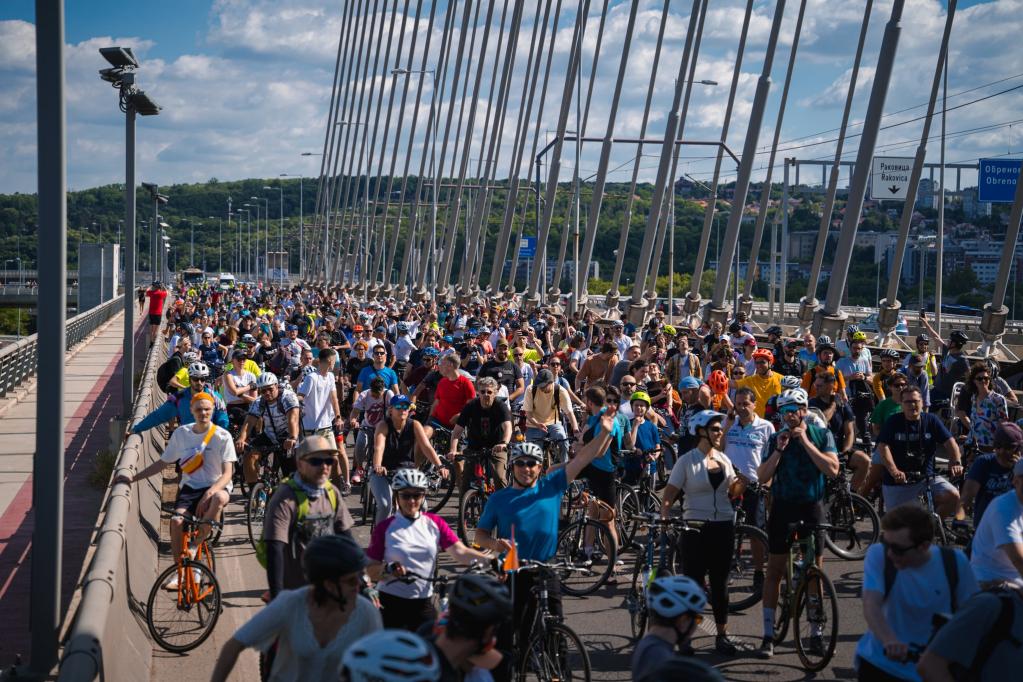
Story
30 May 2025
Rural Women Leading Change: Dialogue on Food Systems, Sustainability, and Entrepreneurship in Serbia
Women from rural areas in Serbia build sustainable communities every day, not only by working the land and feeding their families, but also by launching businesses, preserving tradition, and fostering innovation where few expect it. Behind each of these successes, however, lies a struggle with invisibility, unequal conditions, and limited access to resources. These challenges and ways to overcome them, were at the heart of the recent subnational dialogue on empowering women in Serbia’s agri-food systems.Organized in Novi Sad through the collaboration between the BioSens Institute and the UN Women Serbia Office, the subnational dialogue brought together representatives of institutions, civil society, international organizations, and academia. The event aimed to strengthen the role of women in rural communities, promote inclusive and sustainable development, and enhance multisectoral cooperation in the implementation of the National Guidelines for the Transformation of Food Systems.The dialogue was opened by Jelena Jojić from the BioSens Institute, with additional remarks by Lorenza Jachia from the UN Resident Coordinator’s Office in Serbia and Milica Trajković, Head of the Center for Innovation and Business Development at BioSens. The speakers highlighted the importance of integrating a gender perspective across all development policies and projects related to agriculture and sustainability.From idea to market: Women’s rural entrepreneurship in the spotlightThe central segment of the programme featured a panel discussion titled “Women’s Entrepreneurship in Rural Areas – From Idea to Market,” where female entrepreneurs shared their personal experiences, challenges, and recommendations for improving the position of women in the agri-food sector.Panelists Sanida Klarić, Radmila Nikolić, Aleksandra Pavlović, and Aleksandra Radivojević spoke about their entrepreneurial beginnings, often driven by necessity, and how they went on to build sustainable and authentic brands through perseverance, continuous learning, and hard work.They emphasized the discrimination they faced solely because of their gender yet remained committed to their goals thanks to access to education, support networks, and community solidarity. The importance of relying on local resources and strong female role models from within their own communities was underlined, as was the need for increased access to information on available funding and the protection of women’s economic rights. A particular concern raised was women’s lack of ownership over property and agricultural holdings, which often excludes them from inheritance and limits their access to social protection systems. The concluding message of the panel was clear: while Serbia has a solid legal framework, its delayed implementation continues to hinder the potential of rural women to become true agents of change and development in their communities.Partnerships for SustainabilityThe dialogue was part of the “From Seed to Sustainability – Food Systems for All” initiative, led in Serbia by the UN Resident Coordinator’s Office and jointly implemented by FAO, UNEP, and UN Women, with the support of UNECE and in partnership with the Ministry of Agriculture, Forestry and Water Management and other national stakeholders.The initiative is financially supported by the Joint SDG Fund, with contributions from the European Union and more than fifteen governments, including Belgium, Denmark, Germany, Ireland, Italy, Luxembourg, Monaco, the Netherlands, Norway, Poland, Portugal, the Republic of Korea, Saudi Arabia, Spain, Sweden, and Switzerland., filtered_html
1 of 5
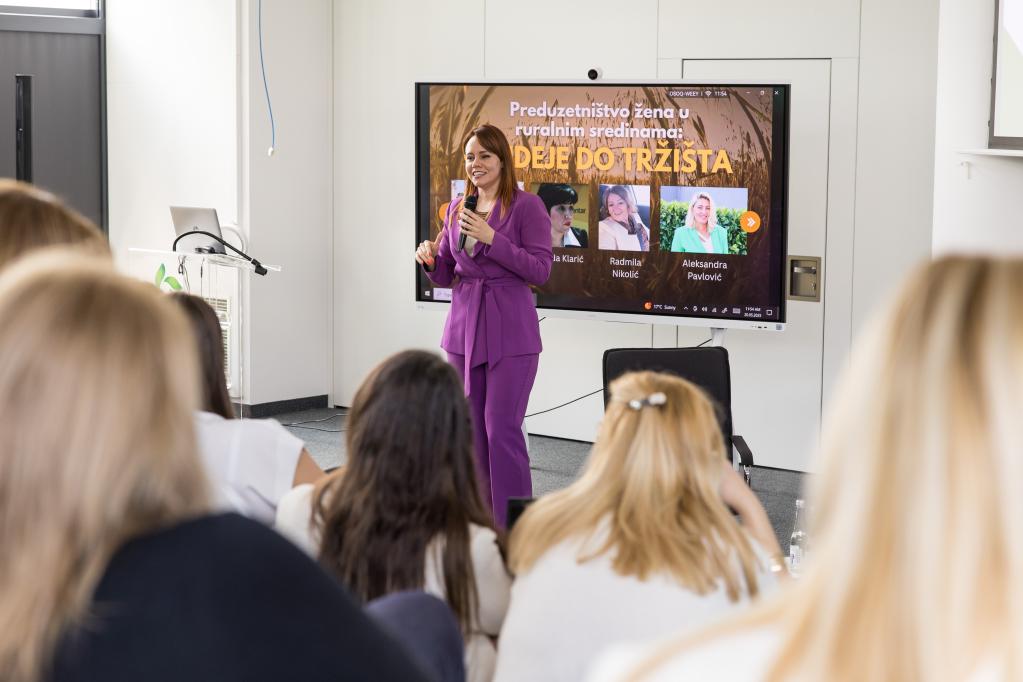
Story
29 April 2025
From Goals to Lives: Serbia and the UN — A Year of Progress on the SDGs
Belgrade, 29 April 2025 - The United Nations Country Team in Serbia today launched its 2024 Annual Results Report, outlining key achievements in advancing sustainable development, inclusion, and resilience across the country. The Report reflects joint efforts with the Government of Serbia, civil society, the private sector and international partners, under the UN Sustainable Development Cooperation Framework 2021–2025.In 2024, the UN in Serbia delivered over 95 million USD in support, spanning more than 200 initiatives in the areas of green transition and climate resilience, social equity and human capital, and the rule of law, gender equality and governance. Prioritizing vulnerable groups and guided by the principle of Leave No One Behind, these efforts resulted in concrete progress on national development priorities and the 2030 Agenda.UN-supported initiatives contributed to improved heating and wastewater systems, local circular economy strategies, and Serbia’s first Green Infrastructure Strategy. At the same time, support expanded early childhood development and mental health services, introduced new digital tools in healthcare and education, and strengthened gender-based violence response mechanisms. Thousands of children, youth, educators and families benefitted from inclusive, community-based programmes.“In 2024, we worked with our partners to deliver results that matter—stronger institutions, more resilient communities, and greater opportunities for all,” said Matilde Mordt, UN Resident Coordinator in Serbia. “As Serbia navigates complex challenges, from demographic shifts to climate impacts, the United Nations remains a committed partner—bringing expertise, partnerships and innovation to help accelerate inclusive, forward-looking reforms aligned with the 2030 Agenda and the EU accession process.”The Report also reflects Serbia’s contributions to regional and global efforts—advancing environmental standards, participating in regional cooperation on sustainable development and youth engagement, and strengthening digital governance.As the UN and Serbia enter the final year of the current Cooperation Framework, the Report underscores the importance of maintaining focus on people-centred policies and long-term sustainability.Download full report. , filtered_html
1 of 5
Story
07 May 2025
From Kolubara to Campania – Learning for a sustainable future
Kolubara, a district in Serbia known for its natural beauty, cultural and historical heritage and a vast tourist offer, could soon become a leader in the transformation of domestic agriculture. Within the one-year project "From Seed to Sustainability – Food Systems 4 All", which is jointly implemented by the UN agencies in Serbia in cooperation with the National Association for Organic Production Serbia Organica, representatives of the Kolubara Bio-district visited the Campania region of Italy, where the first bio-district in the world was established, which has been functioning for years as a model of successful and sustainable agriculture. In the period from 21 to 25 May, producers from the Kolubara Bio-district, together with representatives of UN agencies and Serbia Organica, were guests of the Cilento Bio-district.This study visit is part of a broader initiative to develop the bio-district model in Serbia, with the aim of achieving the Sustainable Development Goals (SDGs), particularly those related to ending hunger, gender equality, responsible consumption, and the preservation of life on land. Knowledge exchange – From region to regionOne of the participants of the study visit to Italy was Ivana Sretenović from the Sretenović Ranch, a family farm in Kolubara that combines organic production and rural tourism. On her husband’s ancestral land, they have developed a nature retreat with apartments, an organic chokeberry plantation and an organic plum plantation. A forest museum has also been established on the Sretenović Ranch. "We love and respect nature. We love healthy food. We take care to ensure our environment is healthy, and we want people around us to be aware of ecology, biodiversity, and everything we do and stand for. So, the bio-district concept naturally came to us, connecting us with people who share the same life philosophy,” explains Ivana Sretenović. During her visit to Italy, she was inspired by how closely producers collaborate with the local community and the fact that most schools and kindergartens use ingredients produced within the Bio-district of Cilento in their canteens. “They have closed the loop: nature, a healthy environment, healthy food, biodiversity, and people. They have been operating for 20 years, and we are about to complete our first. We have already achieved a lot. The most important thing for us is that we are a very cohesive group that works well together, makes decisions, and acts,” says Ivana Sretenović. Kolubara as a pioneer bio-district in SerbiaAs Ivana Simić from Serbia Organica explains, Kolubara was chosen as the pilot area due to the presence of a strong local initiative and its diverse potential: “We have stakeholders who are committed to developing the bio-district, such as certified organic producers, those using organic and agroecological methods, rural tourism operators, as well as schools, institutions, and local associations that are open to cooperation.” When asked about the biggest challenge in transferring the Italian model to the local context, Ivana Simić emphasizes: “Patience is needed, along with gradually building trust among those actors who have not yet actively engaged. People need to believe that this model is not just another project, but a way for the community to become stronger and more resilient, and for their area to further develop and gain recognition and value, both at the national level and abroad.”FAO and sustainable transformation of food systemsThe Food and Agriculture Organization of the United Nations (FAO), which is leading the implementation of this project in Serbia, sees bio-districts as one of the key tools for the successful transformation of food systems."Through this knowledge exchange, our partners from Kolubara have confirmed that they are on the right path and that sustainable models do not have to remain theory, but that they can work in practice," says Aleksandar Mentov, FAO National Program Coordinator in Serbia. He adds that UN agencies in Serbia will continue to provide technical and advisory support in the coming months, with the goal of making the Kolubara Bio-district an example that will inspire other regions in the country and contribute to the sustainable transformation of food systems.Bio-districts and their future in SerbiaBio-districts are geographical areas based on the principles and model of organic agriculture, in which farmers, citizens, tourism and hospitality service providers, educational and scientific institutions, public institutions and associations establish cooperation with the aim of developing sustainable local food systems, improving the management of local resources, as well as promoting the economic and socio-cultural development of the area.In the coming period, Kolubara could become a model example of how local production, shared vision and international cooperation can be combined into a sustainable and functional system – for the benefit of people, nature and future generations. "From Seed to Sustainability – Food Systems 4 All"“From Seed to Sustainability: Food Systems 4 All” is a one-year initiative funded by the Joint SDG Fund, with support from the European Union and the governments of Belgium, Denmark, Germany, Ireland, Italy, Luxembourg, Monaco, the Netherlands, Norway, Poland, Portugal, the Republic of Korea, Saudi Arabia, Spain, Sweden, and Switzerland. This initiative in Serbia is led by the UN Resident Coordinator’s office and implemented by the Food and Agriculture Organization of the United Nations (FAO) together with the UN Environment Programme (UNEP) and the UN Entity for Gender Equality and the Empowerment of Women (UN Women), with support from the UN Economic Commission for Europe (UNECE) and in collaboration with the Ministry of Agriculture, Forestry and Water Management of Serbia and other local partners. , filtered_html
1 of 5
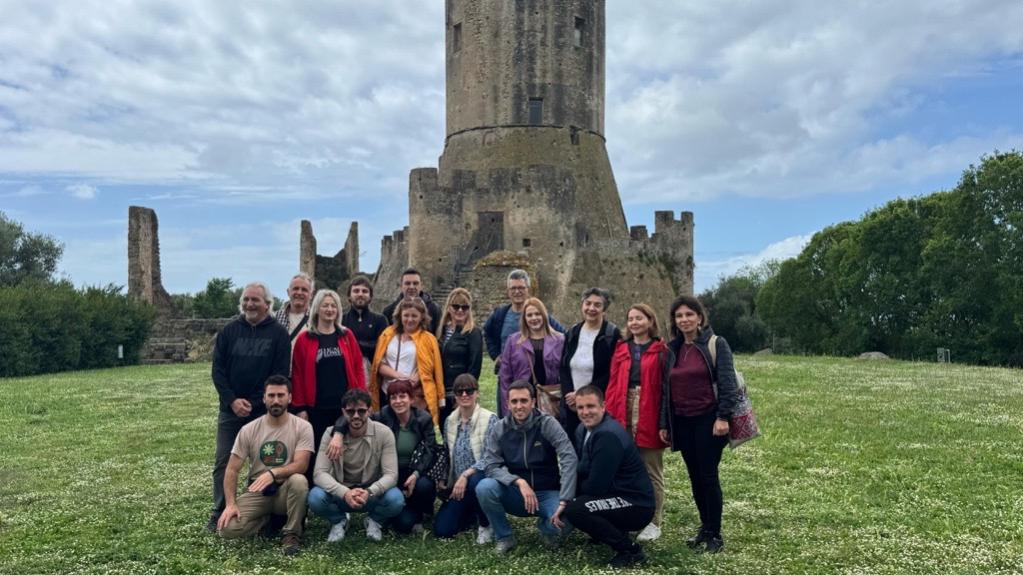
Press Release
10 March 2025
The United Nations in Serbia and the Government of Serbia are working together on a Cooperation Framework for Sustainable Development for the period 2026-2030
BELGRADE, March 10, 2025 - As the current cooperation between the United Nations and the Government of Serbia approaches its conclusion, plans for a new strategic framework for the next five years are well underway. The previous framework (2021-2025), with a total value of 365 million euros, was crucial in aligning with Serbia's development goals, with emphasis on the green economy, human resource development, and strengthening the rule of law. The UN team in Serbia is already preparing the groundwork to continue these efforts for the 2026-2030 period. A special strategic meeting has been organized for this purpose."In this ever-evolving landscape, our duty is to forge a path that not only addresses present challenges but also anticipates future opportunities. The United Nations Cooperation Framework will act as the bridge between aspirations and tangible, lasting improvements for people in Serbia and environment. It’s a promise to work hand-in-hand with all stakeholders, embracing innovation and inclusivity to realize a sustainable future." - Matilde Mort, UN Resident Coordinator in Serbia."The Cooperation Framework is crucial for achieving the outcomes outlined in the 2030 Agenda, which are important for all citizens of Serbia. Through it, we plan to implement UN recommendations in our country and propose solutions for key development challenges over the next five years to achieve the Sustainable Development Goals and ensure a greener, healthier, and better future for our citizens," said Tanja Mišćević, Minister for European Integration. She further emphasized the role of the Government of Serbia as a credible and reliable partner in achieving shared goals and strengthening cooperation with UN organizations.During the discussions, the need for integrated, multi-sectoral strategies for effectively achieving development goals was highlighted. The UN team in Serbia and the Government reiterated their commitment to advancing the 2030 Agenda, maintaining a strong focus on inclusivity and solidarity.Building on the insights and experiences from implementing the Cooperation Framework for the period 2021-2025, the next phase will focus on addressing Serbia's development challenges while supporting reforms related to EU accession. The emphasis will be on creating innovative partnerships and financing strategies suited to Serbia's unique socio-economic situation.“Within this framework, the UN is expected to support Serbia in the process of implementing Sustainable Development Goals and its accession to the European Union. We are pleased not only to shape the role of the UN team in Serbia but also to contribute to the broader discussion on defining the role of the UN in upper-middle-income countries globally. This is a unique opportunity—for us, as representatives of the Government, and for the UN team in Serbia—to set a precedent and establish best practices that can be applied beyond our borders. This is an opportunity to be ambitious in this process, to set high standards, and to engage in work that holds substantial meaning and added value,” says Nikola Stojanovic, state Secretary at the Ministry of Foreign Affairs. The results of this strategic workshop will help define the goals of the new Cooperation Framework, ensuring alignment with Serbia's development objectives., filtered_html
1 of 5
Press Release
24 February 2025
Enhanced Forest Resilience project signed into action in Serbia
Belgrade, 20 February 2025 – Over the past four decades, climate change has had considerable effects on Serbia and forest ecosystems in the country are vulnerable to droughts, increased temperatures, extreme weather events, fires, pest outbreaks and diseases. Forest cover is degrading due to unsustainable wood harvesting, a heavy reliance on forests for energy, rural depopulation and lack of financial and knowledge capital of landowners. On 20 February an agreement for the project “Enhancing the resilience of Serbian forests to ensure energy security of the most vulnerable while contributing to their livelihoods and carbon sequestration (FOREST Invest)’’ was signed between the Food and Agriculture Organization of the United Nations (FAO), in its capacity as an Accredited Entity of the Green Climate Fund (GCF), the Government of the Republic of Serbia, represented by the Ministry of Agriculture, Forestry and Water Management, as well as two public enterprises “Srbijašume” and “Vojvodinašume”.Over the course of seven years, FOREST Invest will enhance the resilience of forest ecosystems, improve energy security for vulnerable communities, and contribute to reducing greenhouse gas emissions. Nearly three million residents of Serbia will indirectly benefit from improved forest resilience and sustainable management.Additionally, the project envisions afforestation of 7 000 hectares with climate-resilient tree species, the conversion of 51 000 hectares of degraded low forests into high forests, and the rehabilitation of at least 500 hectares of abandoned private agricultural land through agroforestry plantations. By implementing these and other measures, greenhouse gas emissions are expected to be reduced by 8.4 million tonnes of carbon dioxide equivalent (CO2 e).The project, valued at USD 84 million, is funded by the Green Climate Fund, while co-financing is provided by the Government of the Republic of Serbia and FAO. This initiative is the result of years of collaboration between FAO, the Forest Directorate of the Ministry of Agriculture, Forestry, and Water Management, and other key national-level partners. "Serbia is committed to a future where forests are protected, energy is secure, and economic growth is sustainable. This project represents a key step towards realizing that vision, but also an expression of the political will for Serbia to become a leader in climate-smart forest management. Thanks to this initiative, we will protect our forests and strengthen Serbia's energy security, reduce dependence on fossil fuels, and open new opportunities for green investments. It is proof of our determination to align national development with global climate goals, while ensuring that the benefits reach communities and economies across the country," said Aleksandar Martinović, Minister of Agriculture, Forestry and Water Management in the Government of the Republic of Serbia.
"The partnership between FAO and the Government of Serbia is built on a shared commitment to sustainable development, food security, and climate resilience. By combining our technical expertise with national priorities, we can drive meaningful and lasting change," added Nabil Gangi, FAO Deputy Regional Representative for Europe and Central Asia."This innovative project in Serbia increases investment in sustainable forestry initiatives that include both mitigation and adaptation measures. Progress in Serbia will guide future efforts in other countries,” said Henry Gonzalez, the Chief Investment Officer of the Green Climate Fund (GCF).The signing of this agreement marks the beginning of a significant transformation in Serbia’s forestry and energy sectors, aimed at greater resilience, energy security, and sustainable development.About FAO and the GCFSince becoming partners in 2016, FAO and the GCF have been scaling up climate investments in high-impact projects that make the agriculture, forestry and fisheries sectors more efficient, inclusive, sustainable and resilient to climate change.By leveraging global partnerships, FAO catalyzes public and private investments in agriculture that promote innovative climate change adaptation and mitigation actions and drive the United Nations 2030 Agenda for Sustainable Development, in line with the FAO Strategy on Climate Change 2022-2031.The GCF – a critical element of the historic Paris Agreement – is the world’s largest climate fund, mandated to support developing countries to raise and achieve the ambition of their national climate plans known as Nationally Determined Contributions (NDCs).Related links:Green Climate Fund greenlights two major FAO-led projects to strengthen climate resilience in Kenya and SerbiaFAO and the Green Climate FundFAO’s work on climate and biodiversityFAO Investment Centre , filtered_html
"The partnership between FAO and the Government of Serbia is built on a shared commitment to sustainable development, food security, and climate resilience. By combining our technical expertise with national priorities, we can drive meaningful and lasting change," added Nabil Gangi, FAO Deputy Regional Representative for Europe and Central Asia."This innovative project in Serbia increases investment in sustainable forestry initiatives that include both mitigation and adaptation measures. Progress in Serbia will guide future efforts in other countries,” said Henry Gonzalez, the Chief Investment Officer of the Green Climate Fund (GCF).The signing of this agreement marks the beginning of a significant transformation in Serbia’s forestry and energy sectors, aimed at greater resilience, energy security, and sustainable development.About FAO and the GCFSince becoming partners in 2016, FAO and the GCF have been scaling up climate investments in high-impact projects that make the agriculture, forestry and fisheries sectors more efficient, inclusive, sustainable and resilient to climate change.By leveraging global partnerships, FAO catalyzes public and private investments in agriculture that promote innovative climate change adaptation and mitigation actions and drive the United Nations 2030 Agenda for Sustainable Development, in line with the FAO Strategy on Climate Change 2022-2031.The GCF – a critical element of the historic Paris Agreement – is the world’s largest climate fund, mandated to support developing countries to raise and achieve the ambition of their national climate plans known as Nationally Determined Contributions (NDCs).Related links:Green Climate Fund greenlights two major FAO-led projects to strengthen climate resilience in Kenya and SerbiaFAO and the Green Climate FundFAO’s work on climate and biodiversityFAO Investment Centre , filtered_html
1 of 5
Press Release
17 December 2024
Serbia Commemorates International Human Rights Day: Emphasizing the Core Values of Freedom, Equality, and Dignity
Belgrade, December 10, 2024 - On this International Human Rights Day, Serbia reinforced the message that freedom, equality, and dignity are fundamental and inviolable, forming the cornerstone of respecting each individual's human rights. The event, organized by the Ministry for Human and Minority Rights and Social Dialogue under the slogan "Free and Equal in a Dignified Serbia," was held with the support of the United Nations and the OSCE Mission in Serbia.The celebration took place at the Yugoslav Cinematheque in Belgrade, attended by high-level officials, civil society representatives, and international organizations. Tomislav Žigmanov, Minister for Human and Minority Rights and Social Dialogue, emphasized that the words "freedom," "equality," and "dignity" are enshrined in the Constitution of the Republic of Serbia. These values represent absolute rights that everyone is obliged to respect and protect, even in times of war or emergency.Matilde Mort, the United Nations Resident Coordinator in Serbia, acknowledged the progress Serbia has made in advancing human rights through collaboration with various stakeholders. However, she noted ongoing challenges, including the consistent implementation of laws, hate speech, and threats against journalists. The United Nations remains committed to supporting Serbia in strengthening the rule of law and fostering a society where every individual's rights are protected and all voices are heard.Ambassador Emanuele Giaufret of the Delegation of the European Union to Serbia stressed the collective responsibility to uphold human rights, ensuring they are not mere standards on paper but a reality for all. He highlighted the EU's dedication to these values both within and beyond its borders and affirmed the cooperation with Serbia in its EU accession process.Janos Babić, Head of the Council of Europe Mission in Belgrade, used the occasion to encourage continued efforts against hate speech, a primary threat to human rights. The Council of Europe, active in Serbia for 22 years, remains focused on combating hate speech and promoting a culture of tolerance.Karolina Hidea, Deputy Head of the OSCE Mission, reaffirmed that the core principles of the Universal Declaration of Human Rights are the foundation of freedom, justice, and peace worldwide, emphasizing our responsibility to protect human rights for all.The event featured a panel titled "Inclusive Practices," with participants from various civil society organizations discussing strategies for promoting inclusivity.Notably, performances by two choirs—a choir from Novi Sad and the Children's Cultural Center Choir from Belgrade—offered a moving tribute, underscoring the day's themes of unity and human rights.International Human Rights Day is commemorated globally every December 10, marking the anniversary of the United Nations General Assembly's adoption of the Universal Declaration of Human Rights in 1948. Established in 1950, this year's theme is "Our Rights, Our Future, Right Now." , filtered_html
1 of 5
Press Release
28 November 2024
A Call to Transform Climate Promises into Action Op-Ed by Matilde Mordt, UN Resident Coordinator in Serbia
As the COP29 concludes in Baku, we find ourselves grappling with the pressing climate challenges of our era, amidst rising emissions and unprecedented environmental crisis. This is a crucial moment, demanding swift and united efforts to ensure the future well-being of our planet.Key in Baku was the ambitious Baku Finance Goal, which sets out a goal of scaling up climate finance to $1.3 trillion for developing nations by the year 2035. Central to this goal is a commitment from developed countries to mobilize at least $300 billion annually. However, even though it triples the current commitment, it is far below what developing countries were demanding. Likewise, real impact of this financial commitment rests on its execution. To what extent these funds are distributed as grants, rather than loans, will test our collective resolve to uphold global responsibility and equity. To turn these pledges into effective climate justice, it is vital that the funds reach those most in need without further straining debt-ridden nations that have contributed marginally to GHG emissions.COP29 also marked significant advancements in standard setting of international carbon markets, after a decade-long negotiation on Article 6. These markets promise to alter the global climate finance landscape, with projections of up to $1 trillion per year by 2050. When combined with the Baku Finance Goal, these initiatives mark a pivotal shift in directing investment towards the developing world. The capitalization of the Fund for Loss and Damage, totaling $730 million, marks another step forward. This will provide support to small island states and least-developed countries that bear the brunt of severe climate impacts.However, amidst these achievements, we are not blind to the gaps. As echoed in the Secretary-General’s closing remarks, the outcomes are foundational, not final. The ambition seen in financial commitments must be paired with urgent implementation.As COP29 concludes, the global gaze shifts forward to COP30 in Brasil, where the stakes will be even higher. The work and compromises that defined this year’s conference must now translate into actionable commitments, particularly as we focus on the new generation of Nationally Determined Contributions (NDCs) that each country must deliver. For the world to stay within the vital 1.5°C threshold, more ambitious action plans are necessary and urgent.Reflecting on future NDCs, Serbia, like many other countries, must substantially elevate its targets in its upcoming NDC, which is to be submitted in early 2025. This is essential for aligning its ambitions with the global push to phase out fossil fuels and accelerate the transition to renewable energy. This is a path that not only meets our environmental responsibilities but also offers economic opportunities with the growth of green industries.In this context, international cooperation, heightened ambition, and strategic implementation become even more critical. Our resolve as a global community is being tested, but with unwavering commitment, we can transform intentions into tangible impacts. The journey continues, driven by our collective determination to meet the essential goals for a healthier, more equitable planet., filtered_html
1 of 5
Press Release
02 December 2024
From Seed to Sustainability: UN's New Initiative for Food Systems Transformation" Launched in Serbia
Mionica, 26. November 2024 – In the presence of representatives from the Ministry of Agriculture, Forestry and Water Management, the local government of Mionica, the Serbian Chamber of Commerce, agricultural producers and members of the Kolubara Biodistrict, academic institutions, the UN Resident Coordinator’s office in Serbia, and UN agencies, the joint UN project " From Seed to Sustainability: Food Systems 4 All" was officially launched today. This project continues the partnership between the United Nations and the Ministry of Agriculture, Forestry and Water Management to transform food systems.Nabil Gangi, FAO Deputy Regional Representative for Europe and Central Asia, highlighted that food systems in the region face significant pressures due to increasing stress on land and water resources, climate change, conflicts, and economic inequalities. He concluded that initiatives such as the project " From Seed to Sustainability: Food Systems 4 All" demonstrate that the food system transformation is both possible and already underway.The goal of the project is to advance four Sustainable Development Goals (SDGs) in Serbia, particularly SDG 2 (Zero hunger), SDG 5 (Gender equality), SDG 12 (Responsible consumption and production), and SDG 15 (Life on land). The objective of this joint programme is to accelerate Serbia’s progress towards the food system transformation through strengthening inter-institutional coordination mechanisms for the effective implementation of food systems transformation by adopting nature-positive production methods and sustainable management of resources through the inclusive and gender-sensitive bio-district model. A bio-district is a geographical area where farmers, citizens, tourist operators, associations and public authorities enter into an agreement for the sustainable management of local resources, based on principles and practices of organic production and agro-ecology, aiming at the fulfilment of the economic and sociocultural potential of the territory. Kolubara bio-district is the first such district in Serbia and Southeast Europe. “This step represents significant progress toward a sustainable future and aligns with our aspirations for Mionica to become a leader in sustainable agriculture, ecological development, and the promotion of healthy, organic food. It is important to note that this project contributes to community development, from uniting local producers and institutions to fostering international partnerships,” said Boban Janković, Mayor of Mionica." From Seed to Sustainability: Food Systems 4 All" is a one-year initiative funded by the Joint SDG Fund, with support from the European Union and the governments of Belgium, Denmark, Germany, Ireland, Italy, Luxembourg, Monaco, the Netherlands, Norway, Poland, Portugal, the Republic of Korea, Saudi Arabia, Spain, Sweden, and Switzerland. This initiative in Serbia is led by the UN Resident Coordinator office and implemented by the Food and Agriculture Organization of the UN (FAO), together with the UN Environment Programme (UNEP) and the UN Entity for Gender Equality and the Empowerment of Women (UN Women), with support from the UN Economic Commission for Europe (UNECE) and in collaboration with the Ministry of Agriculture, Forestry and Water Management. , filtered_html
1 of 5
Latest Resources
1 / 11
1 / 11

